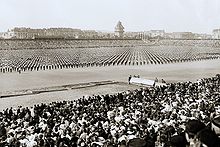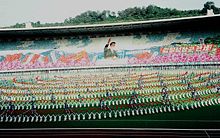- Mass games
-
For the North Korean festival commonly known as the Mass Games, see Arirang Festival.
 Czech Sokol festival, Prague, 1920
Czech Sokol festival, Prague, 1920
 1998 mass games in Pyongyang. The performers are honoring the image of the former North Korean leader Kim Il Sung.
1998 mass games in Pyongyang. The performers are honoring the image of the former North Korean leader Kim Il Sung.
 Arirang Festival mass games display in Pyongyang.
Arirang Festival mass games display in Pyongyang.
Mass games or mass gymnastics are a form of performing arts or gymnastics in which large numbers of performers take part in a highly regimented performance that emphasizes group dynamics rather than individual prowess. The effect of displaying huge images is achieved by having a large number of performers, each dressed in a particular color or holding a sheet of colored cardboard above their head. Because of the vast scale of the performance, often with tens of thousands of performers, mass games are performed in stadiums, often accompanied by a background of card-turners occupying the seats on the side opposite the spectators. Rapid change of images is achieved by exchanging one card for another in a swift and synchronized movement. Synchronization is achieved by means of several hours of rehearsals and much detailed choreography.
Mass games developed alongside 19th century nationalist movements, particularly the Czech Sokol movement, as they embodied youth, strength, militarism, and unity.[citation needed]. Participants were factory workers brought in by Party Secretaries.
In Romania the communist government organized compulsory mass games after Communist Party leader Nicolae Ceauşescu and his wife had visited China and seen such games there. These days were the hardest working days of the year since every individual was required to participate along with his fellow workers. Being late on this day or not shouting the party leader's name loudly enough would lead to being reported by fellow workers and to prosecution.
Today, mass games are regularly performed only in North Korea, where they take place to celebrate national holidays such as the birthdays of rulers Kim Il-sung and Kim Jong-il. In recent years, they have been the main attraction of the Arirang Festival in Pyongyang. The 2004 documentary film A State of Mind details the training of two young girls from Pyongyang who perform in the mass games.
In Bulgaria, mass games were occasionally held during the Zname na mira ("Flag of Peace") international youth festivals. However, Bulgaria did not have a tradition of mass games, and performances were rare.
It was also in North Korea, between 1 August and 10 October 2011. The show was on 4 times a week. Tourists from all over the World including US passport holders was welcomed to the DPRK during Mass Games and everybody was able to watch this fantastic show. Venue was in Pyongyang May Day Stadium, one of the biggest sport arenas in the world.
See also
References
- "Mass Games in North Korea". Insight. CNN. 2005-10-04. Transcript.
External links
Categories:- North Korean culture
- Propaganda in North Korea
Wikimedia Foundation. 2010.
